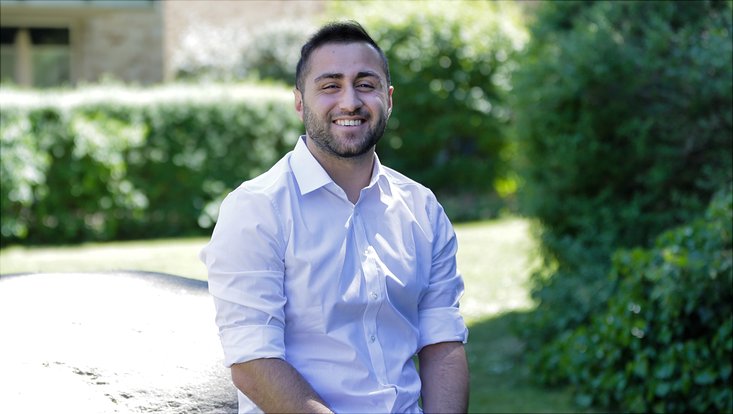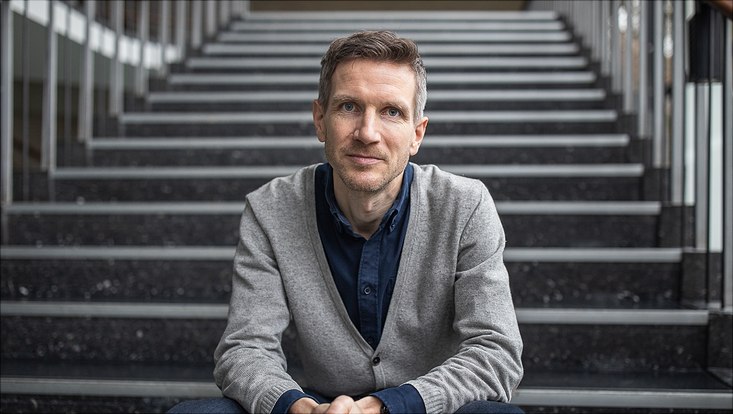From “Hopeless” to HarvardAn interview with: Mahmut Martin Yüksel
21 June 2018, by Janine Fricke

Photo: UHH/Wendt
Poor grades in elementary school almost put an early end to this young man’s pursuits. Now Mahmut Yüksel is working towards a double degree in medicine and informatics at Universität Hamburg and off to earn a medical doctorate at Harvard University.
The grades you got in school were not enough to get you into any college at all, but since then you have had an academic dream career. How did you do it?
In the Hauptschule (lower secondary school), I was under-challenged and underestimated, so in 6th grade I changed to a Realschule (technical high school)—despite my teachers’ warnings that it was “hopeless” and I would fail. As expected, my grades got worse, and I only just managed to scrape through the first year with barely passing grades. It was only after a major life-changing event during the summer holidays after 7th grade that I began to pick up my grades in 8th grade.
When I finally got my Realschule certificate, I wanted to know what else I could achieve. I changed to a Gymnasium (college-prep high school) and finally took my German secondary school leaving certificate—with top marks—in 2012. Now, I am in my 6th semester of the model degree program in medicine at Universität Hamburg, and I began my second degree in informatics in Winter Semester 2017/2018. I am interested in medical technology and computer-assisted neuroscience, which is why I wanted to study both medcine and informatics.
What was this life-changing event that motivated you to get better grades?
My parents took me to visit our relatives in Turkey, and I saw the schools that my cousins were attending. The children there were being taught in very large composite classes, they didn’t have any books or teaching materials, and the building was not up to the standard that I knew from Germany. Some of the girls in the village were not allowed to go to school, even though they wanted to. It was so unfair that they were not even getting a chance. I suddenly realized how privileged I was.
And now you are heading to Harvard for 12 months from October 2018. How did that come about?
In medicine, it is normal to finish your doctoral dissertation while you are still studying. Given that it takes between 3 and 12 months, it also takes much less time than in other disciplines. I knew that I wanted to expand my international experience. Harvard is particularly attractive for me, as it is one of the most renowned universities in the world, and provides very good research conditions in the field of medical imagery.
As I got very good grades for the first part of my studies, I wanted to give it a try. So I applied, and I am really happy that it worked out.
How are the people around you reacting to the news that a former Hauptschule student is now studying and on the way to Harvard?
The reactions are very different. My family, friends, and people I know from the academic world are very proud and congratulate me for this amazing opportunity. Former school friends are always surprised, and they keep asking me: “Are you really studying medicine?”
In the beginning, I didn’t want to face all that skepticism. But now I think it's perfectly fine to talk about your successes. As they say here, “shared joy is double joy.”
What are you planning to focus on in your doctoral dissertation, and what are your expectations for your time at Harvard?
My preliminary topic is “Complexity and Connectivity in First-Episode Psychosis.” Using computer-assisted imaging, I want to examine the complexity and connectivity of 12 to 15 patients who are in the first phase of a psychotic episode.
Mostly, I want to enjoy my time at Harvard, to put the German lens to one side and look at the world from a new perspective. Research in medical imaging is really exciting, and I hope that I meet a lot of interesting people in Boston who will have a lasting effect on my life. Particularly given that it is not just Americans there, but also researchers and academics from all over the world. I just think the environment there will be amazing.
And what are your plans for your return?
Right now I plan to do my written exams in 2021. After that, I can imagine doing a clinical year in neuroscience, psychiatry, or cardiology. I have also considered doing an American medical degree—the United States Medical Licensing Examination. Unless my start-up that I founded with four friends takes off (laughs). We are developing an eLearning platform for first-year students who need to prepare for the medical entrance exam.
What would you like to tell other young people?
I would especially like to encourage people from immigrant backgrounds It’s not important where you come from or what other think you can or cannot do. Germany offers so much educational opportunity that you should appreciate and use to your advantage.
Upon the recommendation of my technical high school teacher I successfully applied to the Startstiftung, a scholarship program for school students from immigrant backgrounds. It provided me for the 3 years up to my Abitur with a laptop, a monthly allowance, and a budget for materials and language courses.
In total I have received 9 different scholarships. Among other things, they made it possible for me to take language courses abroad and attend a neuroscience summer school in Texas. I am now active in the foundation Studienstiftung des deutschen Volkes as a goodwill ambassador for equal opportunity. My job is to inform students about the support they can receive.


